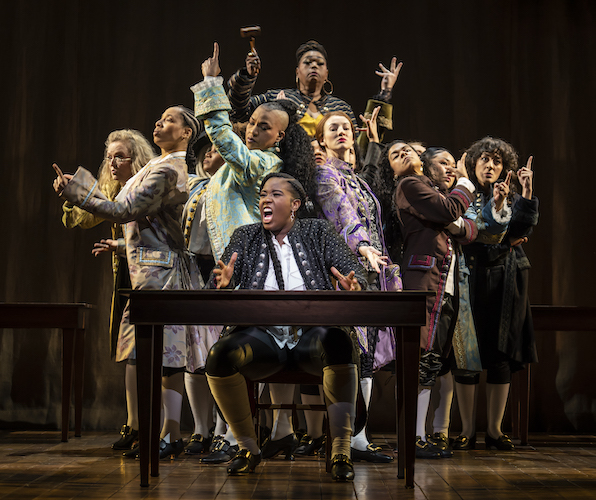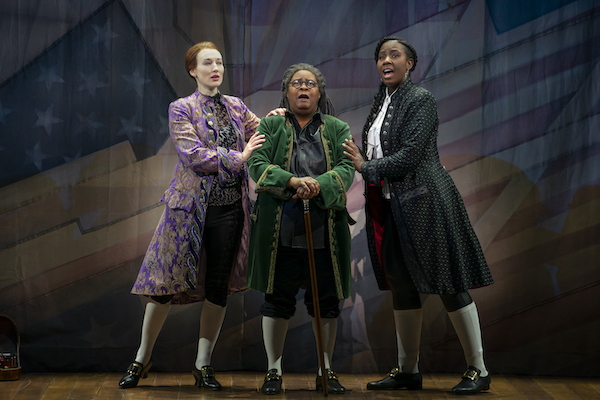Theater Review: Revisionist Revival of “1776” Hits Broadway with a Thud
By Christopher Caggiano
A.R.T Artistic Director Diane Paulus and Jeffrey L. Page are at the helm of this well-meaning but irritating revival.

The company of Roundabout Theatre Company’s 1776. Photo: Joan Marcus.
We here in Boston had a chance to see the current Broadway revival of 1776 at the A.R.T. in Cambridge. (Arts Fuse review) In fact, we’ve had the opportunity to see quite a few of artistic director Diane Paulus’ Broadway-aimed productions, whether those productions were artistically worthy of the A.R.T. or not. (Finding Neverland? WT-Actual-F?)
Don’t get me wrong: Paulus’ thematic ambition is often laudable. In fact, when she’s not launching her latest Broadway cash cow, she frequently programs pieces that reflect progressive themes and fairly reek of the desire for social change.
However, Paulus exhibits a distinct tendency to favor message over craft. Examples over her tenure include the painfully self-important We Live in Cairo; the ludicrously self-congratulatory Witness Uganda (later revised into the equally myopic Invisible Thread); and the turgid Gloria: A Life, which could be used in playwriting classes to teach budding scribes what “show, don’t tell” means by negative example. All noble in conception but wanting in execution.
Which brings us back to 1776. If productions succeeded based on intent, this revival would be a blockbuster. Paulus and her co-director Jeffrey L. Page, who also serves as the production’s choreographer, have taken an admittedly creaky but nonetheless enjoyable musical from the 1960s and cast it entirely with non-white, non-male, non-cisgendered people in roles created for and modeled after privileged white men. Erasing entrenched casting biases is, again, commendable.
But what does it mean? Are Paulus and Page attempting to take back the narrative from the straight white men and highlight the contributions of other people to the founding and building of our country? If so, Hamilton did it first and does it better.
Yes, 1776 is a period piece, but when the show was written and first presented in the ’60s, it actually reflected the revolutionary spirit of the time. Paradoxically, the show was embraced by both liberals and conservatives. Progressives saw the revolutionary nature of the characters of 1776 as a parallel to their own efforts to effect change.
Meanwhile, conservatives took the musical’s patriotism at face value, although then-president Richard Nixon infamously pressured Warner Brothers to cut the number “Cool Considerate Men” from the 1972 movie. (It has thankfully been restored on DVD.) The number portrays the radical self-interest of conservative landowners that almost prevented the Declaration of Independence from happening. Apparently, that idea cut a bit too close to the bone for Dicky Boy.
For all its radical intentions, the current production of 1776 makes very few noticeable changes to the script itself, beyond adding a short speech for Abigail Adams from a famous letter to her husband:
And, by the way, in the new code of laws which I suppose it will be necessary for you to make, I desire you would remember the ladies and be more generous and favorable to them than your ancestors. Do not put such unlimited power into the hands of the husbands. Remember, all men would be tyrants if they could. If particular care and attention is not paid to the ladies, we are determined to foment a rebellion, and will not hold ourselves bound by any laws in which we have no voice or representation.
Again, well intentioned, but a bit heavy-handed, and gracelessly plunked into the middle of an otherwise touching scene.

Elizabeth A. Davis, Patrena Murray, Crystal Lucas-Perry in Roundabout Theatre Company’s 1776. Photo: Joan Marcus.
As for the production itself, end-to-end it suffers from excess, in particular an overabundance of staging. This is particularly true in the overripe, abrasive opening number, “Sit Down, John.” Yes, I suppose it’s possible that, since the song introduces John Adams as a pain in the Continental Congress’s backside, the directors wanted to make the audience feel some irritation themselves. But, if that’s the intent, it’s a counterproductive way to invite the audience into the story.
The production in general is forced and noisy, with not enough clarity of purpose. “Molasses to Rum” is especially egregious in this respect. In fact, the number is loud to the point of being screechy. The surfeit of stage business completely overshadows the acerbic meaning of the song. The song is meant to point out the hypocrisy of the northerners denouncing slavery while profiting from the transatlantic slave trade, but Paulus and Page didn’t trust the number ot stand on its own; instead, they serve up ear-piercing sound and opaque imagery.
Crass directorial choices abound throughout the production. In her song, “He Plays the Violin,” the very talented Eryn LeCroy as Martha Jefferson is encumbered with a vulgar series of orgasmic oohs and aahs and reduced to making crude penis jokes with her husband’s bow.
The production features numerous other examples of the directors not trusting the material. In a scene in which John Adams worries that history will judge the Declaration signatories poorly for permitting slavery to remain in the Declaration, Ben Franklin (an indelible Patrena Murray) tries to assuage John by saying:
That’s probably true. But we won’t hear a thing, John — we’ll be long gone. And besides, what will posterity think we were — demigods? We’re men — no more, no less — trying to get a nation started against greater odds than a more generous God would have allowed.
At this point the lights change dramatically and the cast turns out and mugs to the viewers, as if to say, “Yeah, we know. This part is icky. Don’t blame us.” Not only is this moment devoid of theatrical nuance, it’s also insulting to the audience.
So far, it seems, ticket buyers aren’t having it. The show has been limping along at about $300,000 a week and playing to 75% capacity. Anyone hoping to see a script that successfully challenges contemporary assumptions about our Founding Fathers — and does it in an illuminating fashion — should head four blocks north to the Richard Rodgers Theater — and grab a ticket to Hamilton. It’s six years into the show’s run, so you just might be able to score a ticket.
Editor’s Note: My commentary on the irony of a Broadway revival of 1776 at a time when our democracy is teetering on the edge.
Christopher Caggiano is a freelance writer and editor living in Boston. He has written about theater for a variety of outlets, including TheaterMania.com, American Theatre, and Dramatics magazine. He also taught musical-theater history for 16 years and is working on numerous book projects based on his research.

When I first saw 1776 done it was a spectacular presentation that starred William Daniels as John Adams. The musical score stood out on its own, and you left the theater singing some of the melodies. It was a show where you could see why it won the Tony Award that year for Best Musical. It was such a memorable show, and anyone who saw it felt the same way. Sadly this new production thought that by putting women into all the roles would make an impact, but it doesn’t. It isn’t strong enough. I feel sorry for those audience members being introduced to this musical for the first time, because this production will not have the same effect as did the original on its audience members. I remember this show as a great Broadway Musical. Will today’s audience think the same thing? I doubt it. How can you ruin such a great show and musical score? Well, one just needs to see this production of 1776. What a shame.
Agree 100%. I saw the original production as well. They needed to stick to the original and stop the wokeness.
Brian, I hear you. I was discussing this show with a friend and we both agreed: if you want to say something that badly, write a new show to say it.
Hello Chris,
Greetings from your old hood. I have not seen the show and didn’t even consider it When the ART announced the new production, the re-casting seemed “performative, as they say I think your comment above nails it. If you have something new to say, write a new play.
Hey, Anita. Great to hear from you. Yea, there a many more things to say and many more ways to say them. All you gotta do is write that show.